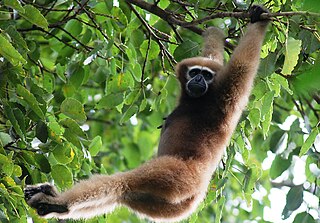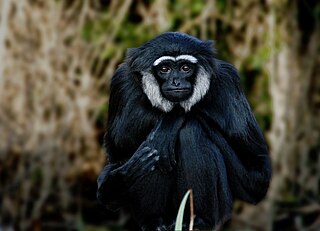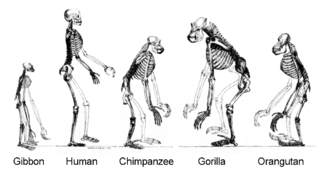
Gibbons are apes in the family Hylobatidae. The family historically contained one genus, but now is split into four extant genera and 18 species. Gibbons live in subtropical and tropical rainforest from eastern Bangladesh to Northeast India to southern China and Indonesia.

Apes are a branch of Old World tailless simians native to Africa and Southeast Asia. They are the sister group of the Old World monkeys, together forming the catarrhine clade. They are distinguished from other primates by a wider degree of freedom of motion at the shoulder joint as evolved by the influence of brachiation. In traditional and non-scientific use, the term "ape" excludes humans, and can include tailless primates taxonomically considered monkeys, and is thus not equivalent to the scientific taxon Hominoidea. There are two extant branches of the superfamily Hominoidea: the gibbons, or lesser apes; and the hominids, or great apes.

The lar gibbon, also known as the white-handed gibbon, is an endangered primate in the gibbon family, Hylobatidae. It is one of the better-known gibbons and is often kept in captivity.

The hoolock gibbons are three primate species of genus Hoolock in the gibbon family, Hylobatidae, native to eastern Bangladesh, Northeast India, Myanmar, and Southwest China.

The agile gibbon, also known as the black-handed gibbon, is an Old World primate in the gibbon family. It is found in Indonesia on the island of Sumatra, Malaysia, and southern Thailand. The species is listed as endangered on the IUCN Red List due to habitat destruction and the pet trade.

The silvery gibbon, also known as the Javan gibbon, is a primate in the gibbon family Hylobatidae. It is endemic to the Indonesian island of Java, where it inhabits undisturbed rainforests up to an altitude of 2,450 m (8,040 ft). It is listed as Endangered on the IUCN Red List since 2008, as the wild population is estimated at comprising less than 2500 mature individuals.

Müller's gibbon, also known as the southerngrey gibbon, is a primate in the gibbon family, Hylobatidae.

The pileated gibbon is a primate in the gibbon family, Hylobatidae.

Kloss's gibbon, also known as the Mentawai gibbon, the bilou or dwarf siamang, is an endangered primate in the gibbon family, Hylobatidae. It is identifiable in that it is all black, resembling the siamang with its black fur, but is considerably smaller and lacks the siamang's distinctive throat pouch. Kloss's gibbon reaches a size 17 to 25 inches and weigh at most 13 pounds (6 kg). As is the case for all gibbons, they have long arms and no tail.
Moloch is the name of a god associated with child sacrifice in the Hebrew Bible and with Phoenician religion.

The genus Hylobates is one of the four genera of gibbons. Its name means "forest walker", from the Greek hūlē and bates.

Nomascus is the second-most speciose genus of gibbons. Originally, this genus was a subgenus of Hylobates, and all individuals were considered one species, Hylobates concolor. Species within Nomascus are characterized by 52 chromosomes. Some species are all black, some are light with a distinct black tuft of crown fur, and some have distinct, light-colored cheek patches. Nomascus is found from southern China (Yunnan) to southern Vietnam, and also on Hainan Island. One species, Nomascus nasutus, has been deemed "the most critically endangered ape species in the world". All species in this genus are either endangered or critically endangered.
The Sumatran lar gibbon, also known as the Sumatran white-handed gibbon, is a subspecies of the lar gibbon, a primate in the gibbon family Hylobatidae. It is native to the island of Sumatra, Indonesia. It shares the tree tops with orangutans, which, like the gibbon, rarely come out of the trees due to predators, such as tigers and possibly sun bears.
The Yunnan lar gibbon, also known as the Yunnan white-handed gibbon, is a subspecies of the lar gibbon, a primate in the gibbon family, Hylobatidae. This Chinese subspecies is thought to be extinct.

The Bornean white-bearded gibbon,, also known as the Bornean agile gibbon or southern gibbon, is a species of gibbon endemic to southern Borneo. It is an endangered species, due to the undergoing logging of the tropical forests, between the Kapuas and Barito rivers. Additional issues are of concern to the endangerment of white-bearded gibbons and threatening to other arboreal primates.

The phylogenetic split of the superfamily Hominoidea (apes) into the Hylobatidae (gibbons) and Hominidae families is dated to the early Miocene, roughly 20 to 16 million years ago.
Carpenter's lar gibbon, Hylobates lar carpenteri, is an endangered subspecies of white-handed gibbon, also known as the lar gibbon. It is listed as an endangered species because it is believed to have undergone a decline of more than 50% in the prior three generations due to loss of forest habitat and loss of mature individuals to hunting. The subspecific name honors primatologist Clarence R. Carpenter.

The western grey gibbon, also known as Abbot's gray gibbon, is a primate in the gibbon family, Hylobatidae. It was named after zoologist William Louis Abbott.

The eastern grey gibbon or northern grey gibbon is a primate in the gibbon family, Hylobatidae.














